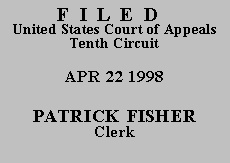

| ELEANOR SCHULER,
Plaintiff-Appellant, v. THE MCGRAW-HILL COMPANIES, INC.; BUSINESS WEEK, a part of or subsidiary of McGraw-Hill Inc., a New York corporation doing business in New Mexico; BUSINESS WEEK ONLINE; GARY WEISS and MICHAEL SCHROEDER, individually and as employees of The McGraw-Hill Companies, Inc., Defendants-Appellees. |
|
Plaintiff Eleanor Schuler brought this action alleging defamation and other torts relating to defendants' publication in Business Week magazine in September 1994 of an article entitled "Did the Amex Turn a Blind Eye to a 'Showcase' Stock?". The article was subtitled, "The Bizarre Printron Case Shows the Exchange Too Often Ignores the Most Glaring Signs of Trouble," and it discusses the American Stock Exchange's ("Amex") listing of small companies on its Emerging Company Marketplace ("ECM"). The article focuses on Printron, Inc., an Albuquerque company of which plaintiff had been chairman and chief executive officer. As it relates to plaintiff, the district court aptly summarized the article as follows:
The article refers to Plaintiff's status as a transsexual and it treats certain aspects of her life when she was a man known as John Huminik, Jr. The article also examines Plaintiff's involvement in two lawsuits filed against her by the Securities and Exchange Commission ("SEC"). One of the lawsuits was filed against Plaintiff in the mid-1970s when she was John Huminik; the other was filed against Plaintiff in 1991 when she was Eleanor Schuler, that is, after her sex change. Both lawsuits were resolved by injunctions barring Plaintiff from committing future securities law violations. In both cases, Plaintiff neither admitted nor denied the allegations against her; however, she signed consent decrees agreeing to entry of the permanent injunctions.
After Printron was listed on the ECM, the value of its stock plummeted from fourteen dollars ($14.00) per share to twenty-two cents ($.22) per share. The article criticizes the Amex for failing to screen companies properly before listing them on the ECM. In addition, the article criticizes Printron for failing to reveal to investors Plaintiff's involvement in the SEC lawsuit filed against her when she was a man. The article raises the question of why Schuler received such lenient treatment in the 1991 lawsuit, and the article speculates that perhaps the SEC did not know that Huminik and Schuler were the same person.
Schuler v. McGraw-Hill Cos., ___ F. Supp. ___, No. CIV. 96-292 SC/RLP, 1997 WL 809755, at *1-2 (D.N.M June 11, 1997).
Plaintiff filed this action asserting claims for defamation; invasion of privacy through false light, publication of private facts and intrusion; intentional infliction of emotional distress; interference with contractual and prospective business relations; and prima facie tort. She contends generally that the article defamed her by stating or implying that she was dishonest and deceptive, that she underwent her sex change to conceal her past, and that she concealed her sex change and prior SEC problems from the Amex, investors and the SEC.
On defendants' motion pursuant to Fed. R. Civ. P. 12(b)(6), the district court dismissed the complaint. The court concluded that the article did not include any false statements of fact on which to base the defamation or false light claims. The court rejected plaintiff's claim for publication of private facts because her sex and name change had previously been discussed in magazine and newspaper articles. It concluded that because the article did not contain defamatory falsehoods or other indication of outrageous conduct, plaintiff did not state a claim for intentional infliction of emotional distress. The court also held that because her interference with business relations claims were premised on her claims for defamation, invasion of privacy and infliction of emotional distress which had failed, these claims should fail as well. Finally, the court concluded that plaintiff abandoned her intrusion and prima facie tort claims, and in any event, her allegations did not state valid claims. Plaintiff appeals the dismissal of all claims except the latter two.
We review a district court's dismissal of a cause of action for failure to state a claim de novo, and will uphold a dismissal "only when it appears that the plaintiff can prove no set of facts in support of the claims that would entitle [her] to relief, accepting the well-pleaded allegations of the complaint as true and construing them in the light most favorable to the plaintiff." Yoder v. Honeywell, Inc., 104 F.3d 1215, 1224 (10th Cir.), cert. denied, 118 S. Ct. 55 (1997). We have fully considered plaintiff's arguments and reviewed the record, and we reject plaintiff's contention that she stated valid claims. Therefore, for substantially the same reasons as stated by the district court, we affirm the district court's dismissal of her complaint.
The judgment of the district court is AFFIRMED.
Entered for the Court
Circuit Judge
*. This order and judgment is not binding precedent, except under the doctrines of law of the case, res judicata, and collateral estoppel. The court generally disfavors the citation of orders and judgments; nevertheless, an order and judgment may be cited under the terms and conditions of 10th Cir. R. 36.3.